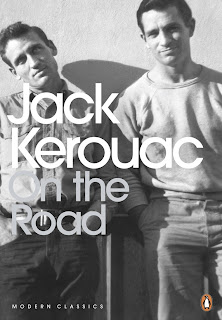There are some great moments; I particularly liked the description of roads being widened and laws abated to make way for one of Dean’s visits. The latter stages in general, the trip to Mexico and the slow unravelling of Sal’s sometime companion prove to be more sympathetic. There were a number of genuinely moving occasions where I felt Kerouac really got ‘it’, and his observations of friends worked well too, even occasionally of fellow travellers:
…because her heart was not glad when she said it I knew there was nothing in it but the idea of what one should do.There’s nothing particularly revelatory in this observation, but it works. Most supporting characters however fair less well. For example when Sal finds himself...
... wishing I could exchange worlds with the happy, true-hearted, ecstatic negroes of America.Oh dear, the last time I read something that patronising was a Guardian account of the working class. Unfortunately this isn’t isolated either; the otherwise excellent trip to “Mehico” has a wince-inducing indigenous population who supposedly speak ‘a leetle like theees’ and descriptions of women that wouldn’t be out of place in an airport novel. “We don’t understand our women”, says Sal, that much was obvious; men are predators and most women exist to be nailed; the 1950’s expression for this is to “work” or “make”, but let’s not argue terminology.
Camus wrote “it is not a matter of explaining and solving, but of experiencing and describing", appreciation doesn’t require empathy; the question is whether these slight descriptions are a failure of Sal or the author. Since it is a largely autobiographical work I tend toward the latter view; on the Camus test, Kerouac scores highly on one criterion but has mixed success - and some notable failures - on the other.
Yet here I am, over a week later and still I think of “On the Road”. For a large part, even after I had finished, I found the central friendship of the two frustrating; Dean is a horrible character, less shaman, more charlatan; but in this, bizarrely, lay my hope. Sal knows who Dean is but loves him just the same.



0 comments:
Post a Comment